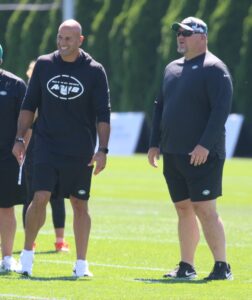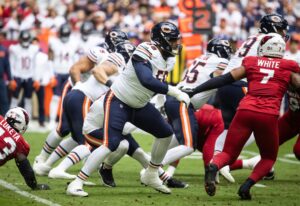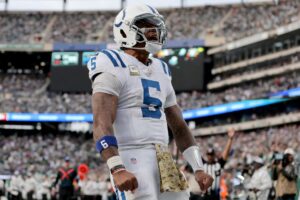Long a polarizing subject amongst analysts and fans, Eli Manning’s Hall of Fame candidacy continues to spark debate following his retirement in January. A predominant view that has emerged is, apart from two brilliant postseason runs, much of Manning’s career remains marked by mediocrity. In several respects, there is certainly validity to that argument. His career record sits fittingly at 117-117, and 60-77 since the Giants’ last Super Bowl title in 2012. His passer rating stands at an unremarkable 84.1, and he has paced the league in interceptions three times. While a drawn-out decline, facilitated by consistently poor offensive line play and front office disarray, marked the latter stages of Manning’s career, his toughness, signature unflappability, and elevated play on the game’s biggest stages should lift him to first-ballot consideration.
Making the Case for Eli Manning in the Hall of Fame
One could argue that from a purely statistical standpoint, Manning has accomplished more than enough to warrant admission into the Hall. Ranking seventh all-time in passing yards, touchdowns, and completions, Manning’s longevity places him in all-time great company. His streak of 222 consecutive starts is a testament to his unfailing durability — perhaps the most valuable asset of a franchise quarterback. For perspective, the Cleveland Browns shuffled through 24 different starting quarterbacks throughout that same span.
Manning’s Hall of Fame case, however, extends far beyond numbers. Starting for 16 seasons at quarterback in the nation’s least forgiving market, Manning’s ability to steer entirely clear of media controversy and consistently represent the Giants organization with class is perhaps his most uncelebrated accomplishment. Whether in the form of accepting undue blame or smiling in the face of escalating criticism, Manning’s constant accountability distinguishes him from a vast portion of his peers. His 2016 Walter Payton Man of the Year award represents widespread recognition of his revered character.
When the lights shined brightest, Manning’s calm demeanor and palpable poise seemingly always prevailed. Only Tom Brady and John Elway have engineered more game-winning drives in the postseason — and the disparity between their playoff sample sizes and Manning’s is noteworthy. His first Super Bowl victory over the then-undefeated New England Patriots stands amongst sports’ greatest upsets. While his Houdini-esque escape and throw to David Tyree is etched in the annals of NFL history, his 38-yard sideline dart to Mario Manningham in the Giants 2012 Super Bowl victory over New England was perhaps an even more impressive throw.
The imperfection of Manning’s career makes it one of the most incomparable in NFL history. Two seasons after reaching his peak, throwing for nearly 5,000 yards and leading the Giants on a second improbable Super Bowl run, Manning tossed a jarring league-leading 27 interceptions during a lost 2013 season. Stretches of puzzling play were as much a part of Manning’s career as anything. Eli Manning’s unique Hall of Fame case, however, rests upon his place as perhaps the most respected, classy leader, outside of Derek Jeter, in New York sports history. His signature underdog victories stand amongst the city’s finest sports moments. Beyond simply New York sports, his impact on the NFL at large is undeniable — taking down the game’s greatest dynasty, twice, in improbable fashion. The story of the NFL cannot be told without Eli Manning.






